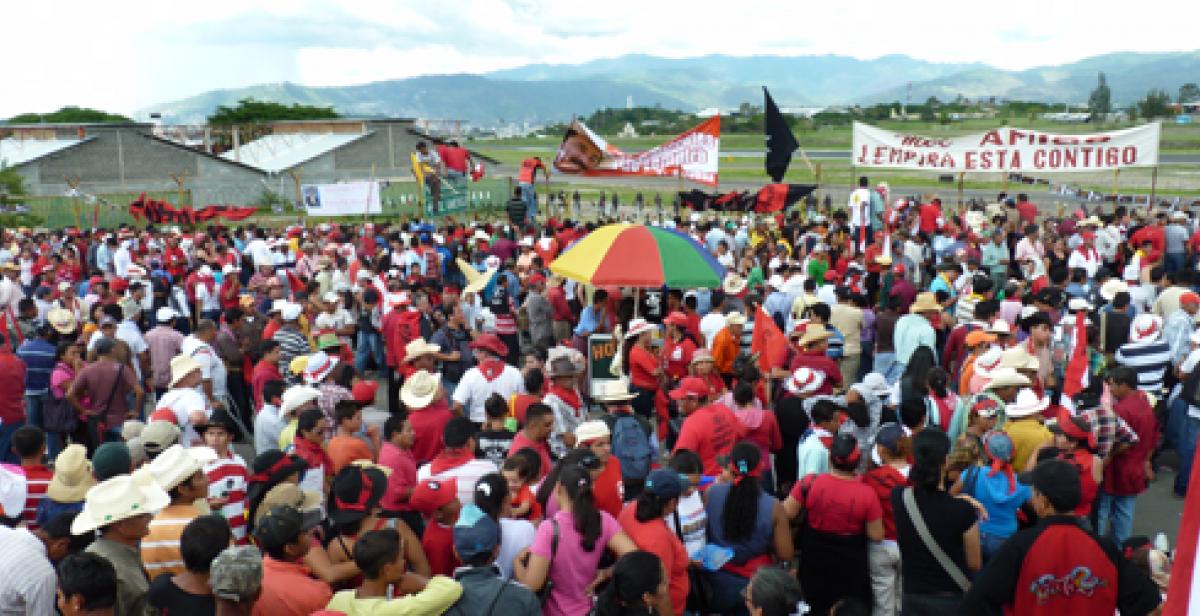Our special correspondent on the ground asks if Hondurans will be blowing out the candles this week to mark the anniversary of the military coup that swept the country two years ago today (28 June 2011)
Exiled President Zelaya returned to Honduras last month and subsequently the country was readmitted to the Organisation of American States (OAS).
But, for most Hondurans genuine celebrations cannot begin while impunity reigns. And It doesn’t look like the perpetrators of human rights violations that took place after the coup will be brought to justice anytime soon.
José Padilla, for one, sees no reason for celebration. This week, he will be forced to leave his country. “It is the only way out for me,” says José, a nurse at the Centre for the Prevention of Torture.
José has experienced violent intimidation three times in the last year and has had to move home because of it. On one occasion, he was struck across the face with a pistol. And only a few days ago, three men from the special police pointed a gun at him again while insulting him. He says this recent episode is the last straw for him.
José believes that his life is in danger. And he’s not alone, many other human rights defenders, gay activists and members of the Resistance Front, have been threatened and intimidated since the 2009 coup. At least 48 Lesbian, Gay, Transsexual and Bisexual persons have been murdered over the last two years. Allegations are not being processed.
Most civil society organisations agree that a year and a half after a new government took office, repression continues, and violence targeted at certain groups has even increased, with a climate of impunity prevailing in the country.
The military coup, a backwards step for human rights
Omar Rivera, of Civil Society Group, says, “After the coup, a culture of disrespect for human rights arose, and that culture has continued to grow.”
Campesino communities in the Lower Aguán region, in northern Honduras, have especially suffered from violence since the beginning of 2010. Human rights abuses here are linked to a land tenure conflict between the campesinos and a few large landowners in the area. 27 peasants have been killed and 20 have been wounded.
This weekend was again marked by the killing of a rural farmer by unknown individuals in the area. And although agreements have been reached to ensure that the human rights of “the involved parties” are respected, so long as impunity reigns and murders go uninvestigated this is unlikely to be achieved.
Impunity on the rise
Honduras is also well-known for being one of the world’s most dangerous countries to practise journalism in. The alarming stream of murders – 11 journalists were killed in 2010 – have not been investigated.
Alba Mejía, executive director at the Centre for the Prevention of Torture, says that “impunity came hand in hand with the coup. And a spiral of impunity has since been on the rise. This is extremely dangerous as an utter lack of good governance is leading people to hire paramilitaries and take justice into their own hands. Levels of citizen insecurity are on the up.”
Murder rate soars
Amidst this climate of neglect, violence against women has soared alarmingly. During the first two months of this year alone, a woman was killed every day. And according to Honduras Violence Watch, 440 were killed in 2010, more than double the number of women murdered in 2006.
Gender-based violence is now the second highest cause of death for women of reproductive age in Honduras. Again, convictions for those crimes are few and far between. A coalition of several Honduran NGOs, the Tribunal of Women against Femicides, says that women are dying while the police remain “systematically indifferent”.
Alba sees no evidence of a functioning democracy. She says, “I do not see State authorities – who are sworn by law to respect and promote human rights - complying with their duties. Authoritarianism is permeating all State bodies, and institutions such as the Public Prosecution Office and the Supreme Court have no more independence than they did in the wake of the coup.”
No signs of justice in court
Furthermore, Omar says, “the main actors who were involved in the coup - whether the Prosecutor-in-chief, the Supreme Court, or the leaders of the armed forces - have not been suspended or punished. Not only that, but these people are currently maintaining their privileges, holding power in State institutions.”
And despite recommendations by the international community, the government has not yet reinstated judges who were removed from their posts for speaking out against the coup.
A ticking bomb?
Francisco Gallén, in northern Honduras, says that “action taken by the government has been aimed at achieving international recognition. The government needs to convey an image of normality. But at the same time it tries to obscure and cover up social conflicts and disregards the recommendations of international missions on human rights.”
In Omar’s view, one of the main reasons behind Zelaya’s return to the country was to meet the conditions of the ‘Cartegena Agreement’ and enable re-admittance to the OAS. He says “the Inter-American Development Bank, which belongs to the OAS system, is Honduras’ main funding bank. So returning to the OAS was economically pivotal for the country.”
And Omar agrees that regretfully “social public policies as well as any activities intended to look after citizens’ welfare have been abandoned”.
In conclusion, the gap between the rich and the poor and polarisation between those who backed the coup and those who opposed it continues to widen. And some fear that without good governance, an explosive situation is still likely in Honduras.
Photo: Supporters of Zelaya gather at the airport to welcome the exiled president back to Honduras. (©Progressio)
For security reasons some of the names of those quoted in this article have been changed.



